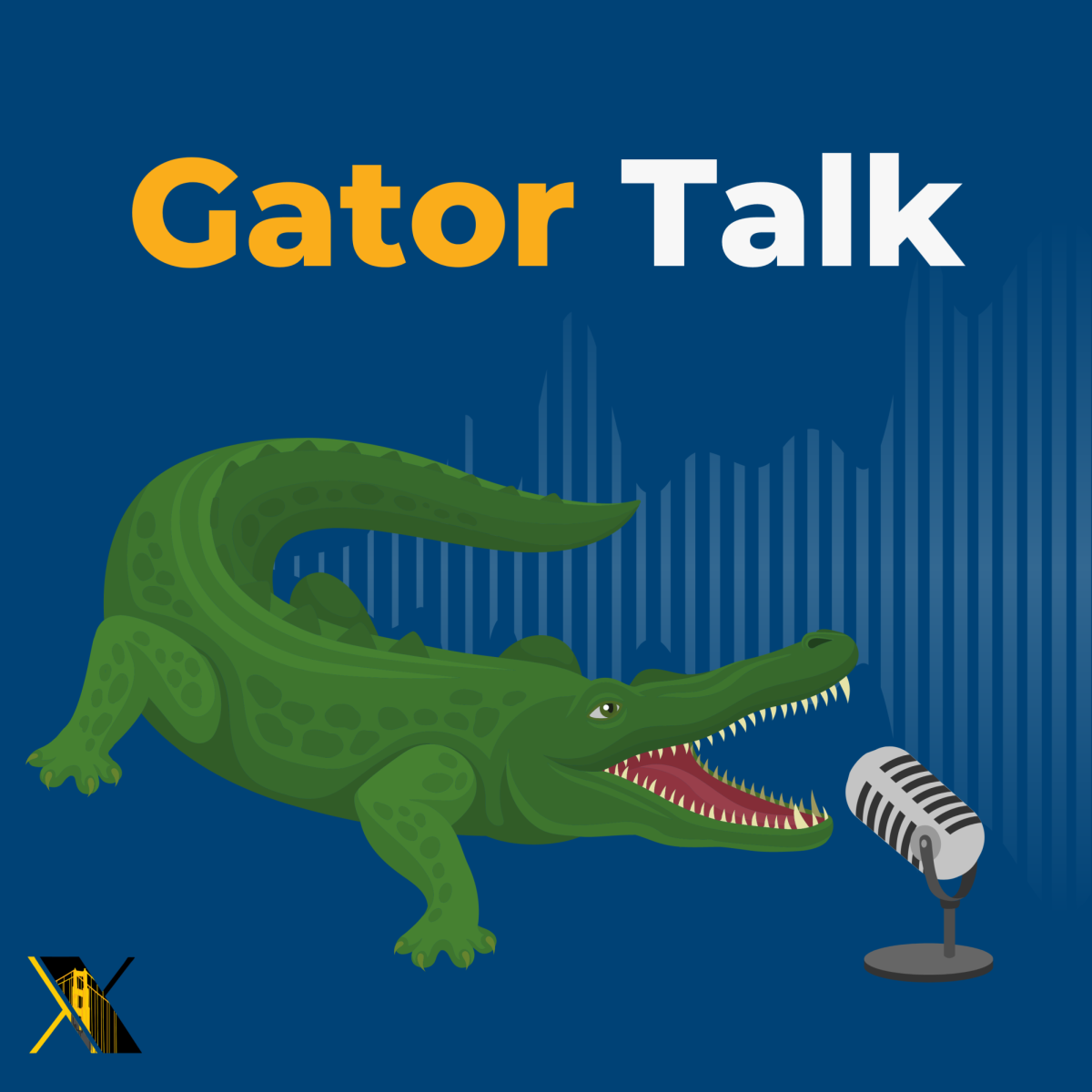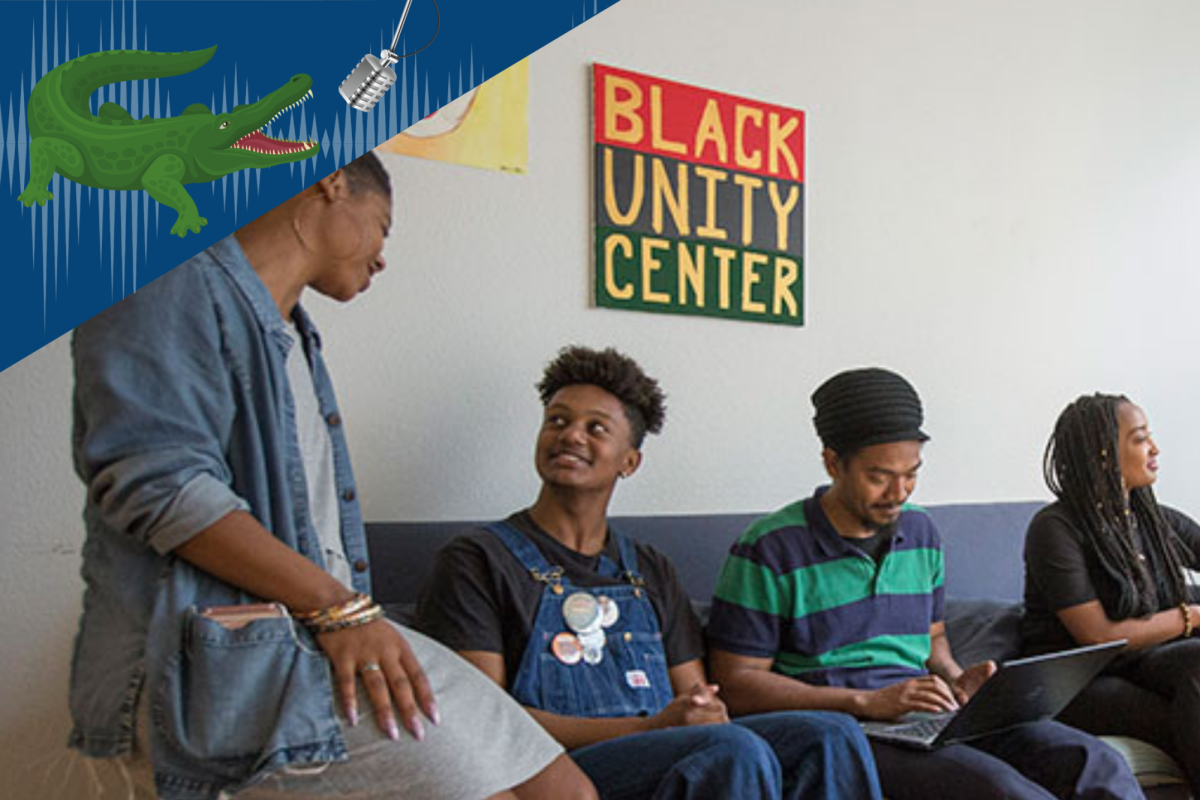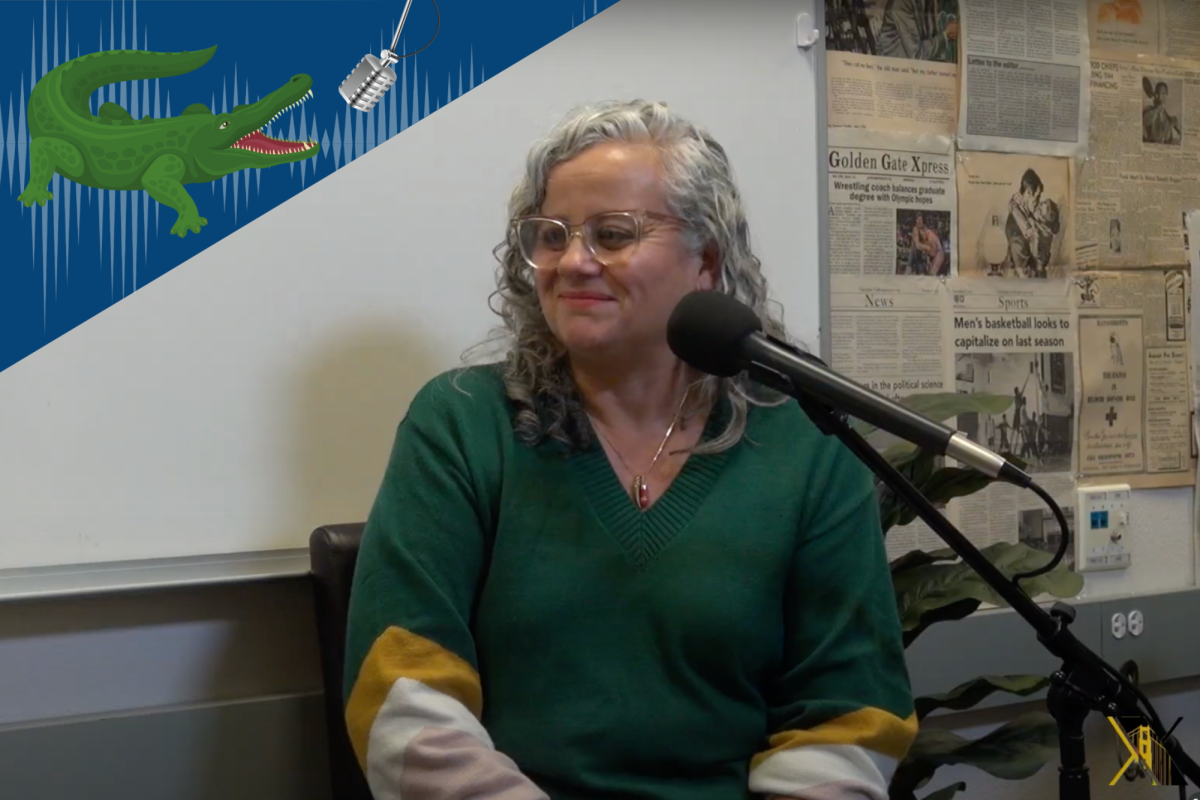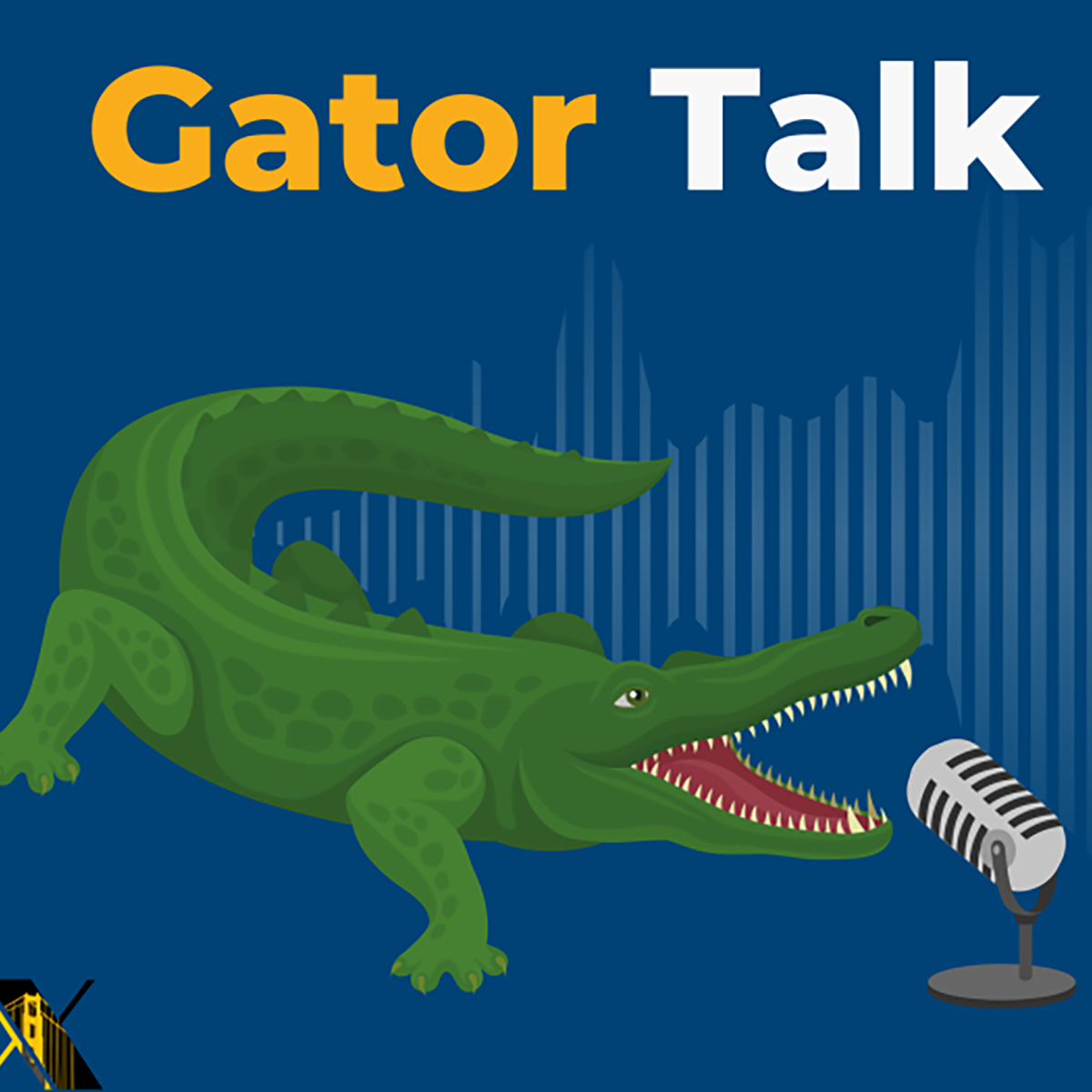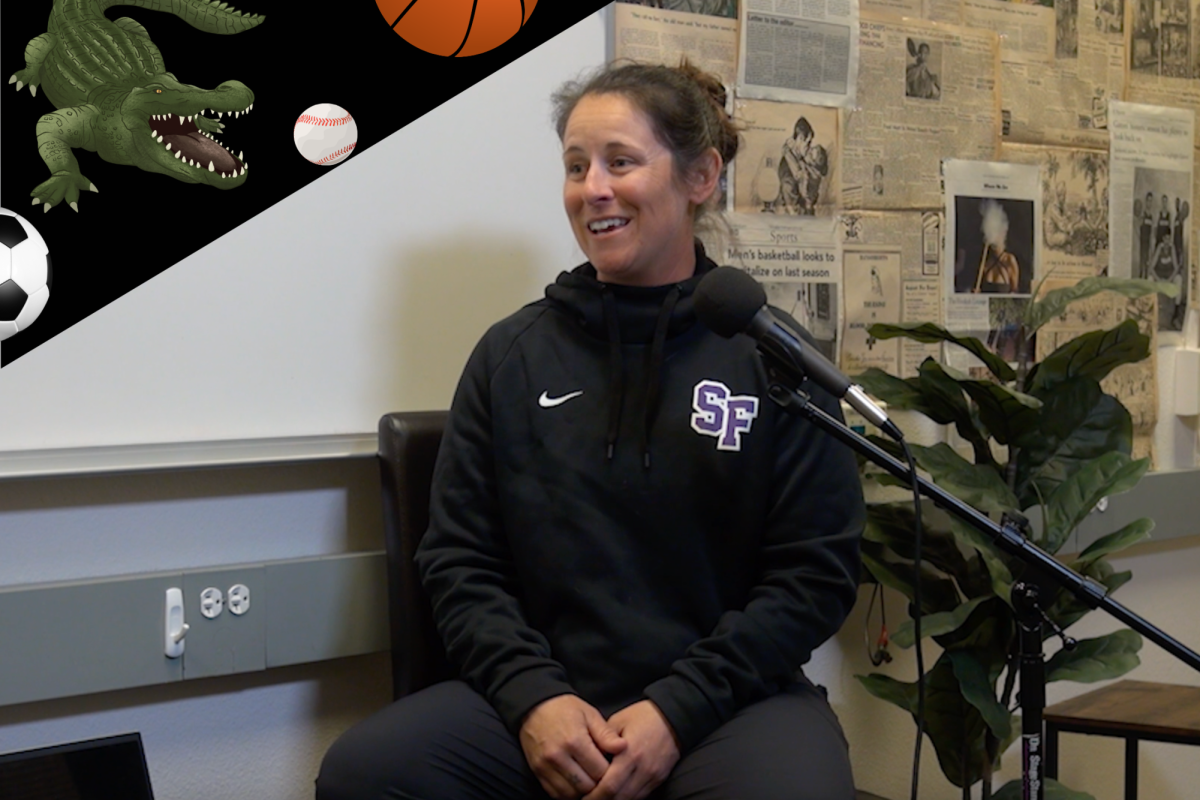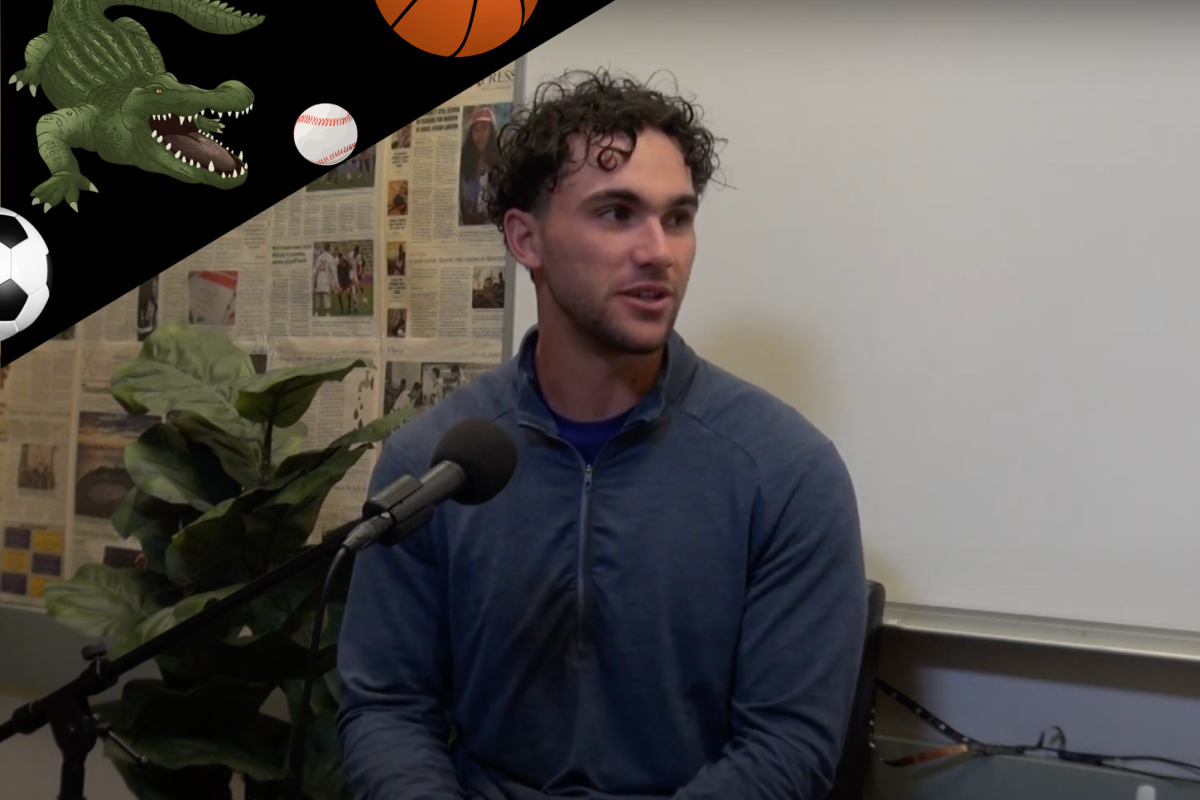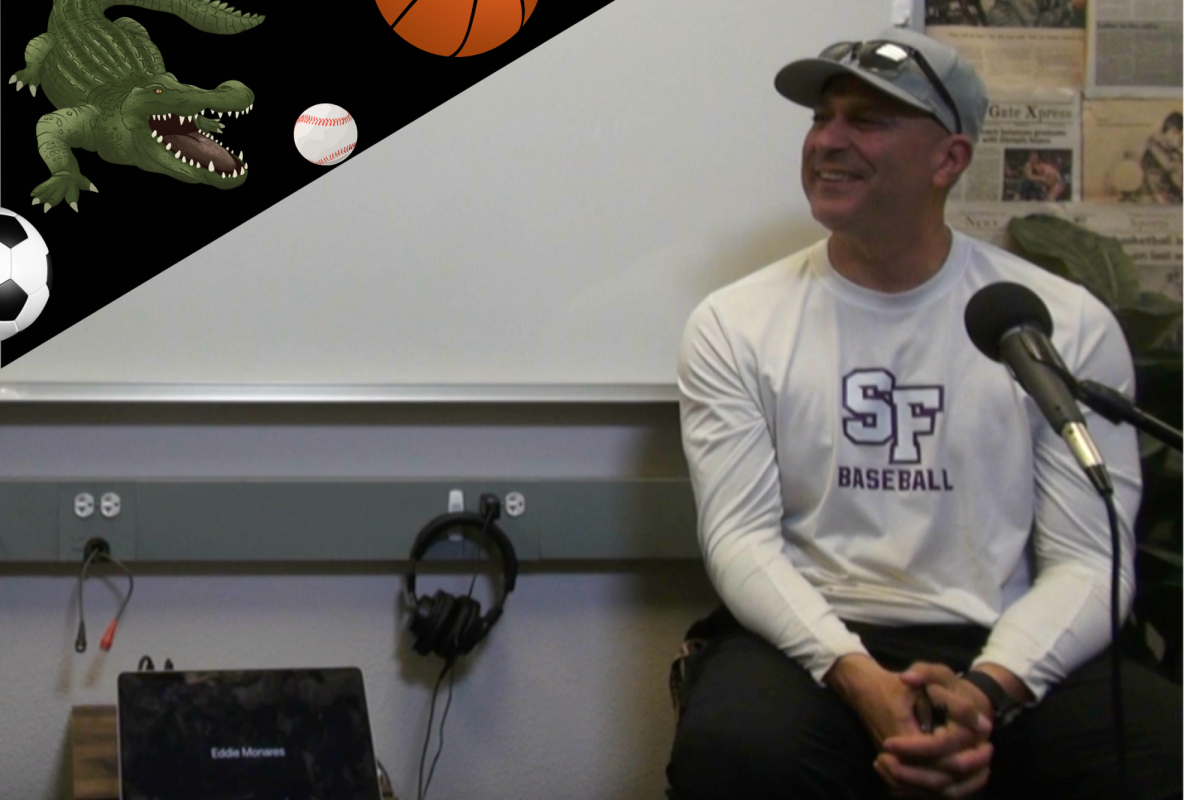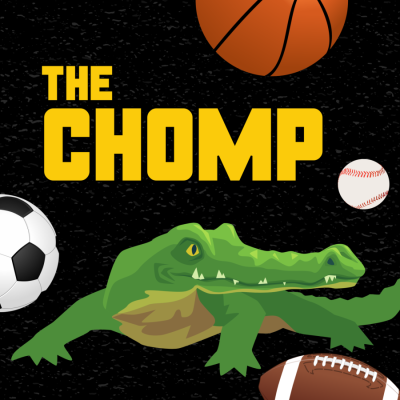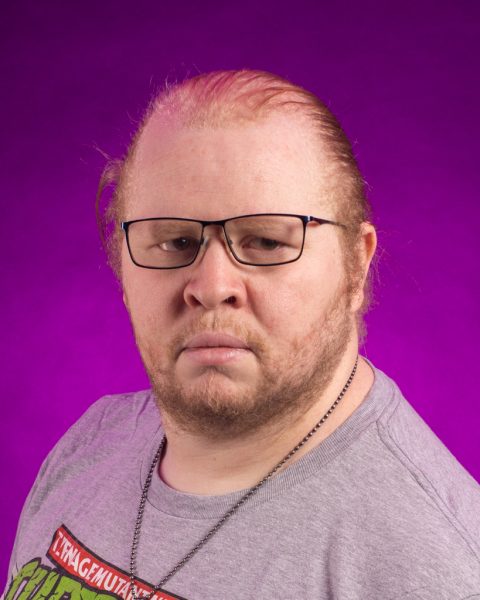Intro
Matthew Ali 0:00
My name is Matthew Ali. I’m a reporter with Golden Gate Xpress, and this is Gator Talk.
Joe Field is a Gator-turned-comic industry genius who changed it forever when he came up with a little nerdy holiday called Free Comic Book Day.
We’re with him today to talk about the road he took to bring us all not only free comics but also how he helped relocate Marvel’s first family to Stockton, California.
Interview
Matthew Ali 0:27
Hey, Joe, how are you today?
Joe Field 0:29
I’m doing well, how are you, Matt?
Matthew Ali 0:31
I’m good. I’m good. What was your time, like here at San Francisco State, back in the day?
Joe Field 0:38
Yeah. Back in the day, I was at San Francisco State from fall of ‘76 to spring of ‘78, getting my degree in broadcast communication arts. I know it has some fancier name these days, but back then it was all about radio and TV and there wasn’t any of the other electronic media stuff. But I enjoyed my time at SF State quite, quite a bit. I did not live on campus, I lived with an elderly aunt and uncle in the Sunset District. So, I had — I had a little bit of freedom that other students didn’t have being stuck on campus — I could come and go as I pleased. It was — it was a really nice time. There were a lot of good people working at state — professors, teachers — just a really good support system. And I turned that into my first career in radio sales and marketing. So I did use my degree, and I’ve continued to use it because my minor was in marketing. And so I’ve continued to be something of a marketer in all these years since.
Matthew Ali 1:47
That’s awesome. Um, what were you — what did you do after graduating?
Joe Field 1:52
I don’t know if they still do this, but every semester, the broadcasting department — excuse me, every spring semester — the broadcast department would do a thing, a week of seminars where students didn’t have to go to class, but they had the option of going to two different seminars related to the broadcasting field — I think it was called the Broadcast Industry Conference or something like that. So, it was a week in probably March or April, the spring semester. And rather than go to any of those events, I decided I would get on the road and find a job in radio. So, I took that week as a week to drive from Bakersfield all the way up to Sacramento, over to Lake Tahoe, and through the throughout the Bay Area, visiting radio stations dropping off my resume, having some interviews and I wound up getting several job offers from that. But the one I took was the one in Stockton, atKJOY AM, largely, because my girlfriend at the time who has become my wife for the last 45 years — she was attending University of Pacific and getting her teaching credential, so, it put me in close proximity to the one I wanted to be in closest proximity to.
Matthew Ali 3:09
So, how did you end up going from radio and broadcast into comics?
Joe Field 3:17
Well, the story of how I moved from radio into comics was essentially this: the gentleman who hired me for KJOY AM, was a was a really solid guy. His name is Ort Loftus — he was a part of a radio station group, and then we had KJOY and K Jackson Stockton. And he was a tough guy, but, but fair, and someone who taught me the ropes of the sales and marketing end of radio. But he retired about — I think six or seven years into my time there. So that would have been about 1984, I think. And the stations were turned over to a family member who had no experience with broadcasting, who only had experience with failed businesses, and he brought that magic touch to KJOY and it became a pretty difficult situation there.
So, I started looking around to do something else. But at the same time that was happening I was still doing my job as marketing director, and you know what one of the loudmouths about about Stockton and about our radio station. So, I came up with the idea in 1985 to — seeing that Marvel Comics’ 25th anniversary was going to happen in 1986 — I came up with an idea to sort of meld all of the stuff that I loved — living in Stockton, the radio station, Marvel Comics — and I started a campaign to ask Marvel Comics to name Stockton as the home of the Fantastic Four for the 25th anniversary. And that was based upon a continuity glitch in the comics where everyone else, all the characters in the comics were living in real cities and not fictitious cities. But in the first issue [of] the Fantastic Four, it says they were from Central City, and years later that was amended to say Central City, California. And I took that as an opportunity to ask Marvel Comics to rename Central City, California as Stockton and make Stockton sort of the home for these superheroes.
Stan Lee got involved with it, even though he was retired as publisher of Marvel at that point — he was in Hollywood trying to get movies and TV shows made. But a reporter called him and asked him what he thought about it. And he, in his typical, inimitable Stan Lee fashion said, it is Marvel Comics’ duty to save universes every day, this is the least we can do for little old Stockton. And if Stan said it had to happen, then the publishing wing of Marvel Comics had to make it happen.
And so, they did in the 25th anniversary issue of the Fantastic Four that came out in the summer of 1986. And when it was accepted that Marvel was going to do it, there was a presentation on the steps of Stockton City Hall, in which Stan gave a proclamation stating that Stockton was now the home of the Fantastic Four, and gave that to the mayor of Stockton, and all the TV stations and radio stations in Northern California were there. We did a lot of interviews that day. And Stan loved it. He loved the cameras. So that was a that was a big deal for him and at the end of that, we did a signing at Al’s Comic Shop in Stockton, which after all this time is still going. They’ve been there since about 1978. And after that, we went to lunch, Stan, and the guy dressed as Spider-Man and I went out to lunch. And during lunch, Stan said to me, you know, kid, you did a great job on this promotion. And I said, “Well, Stan, if you ever need a PR guy, just give me a call,” never ever thinking that he would call. But a few months later he did. And said, “Remember when you asked me if I ever needed a PR guy to give you a call?” Well, his wife was — her first novel was being published, there was a steamy little romance called The Pleasure Palace about love on a cruise ship. But her publisher wasn’t giving her a lot of promotion or any promotion really. So, Stan wanted to get her interviews and reviews, do some newspaper and particularly radio kind of stuff. So, for about the next three months, I worked for Stan and Joan Lee, getting reviews and interviews for her book called The Pleasure Palace. And from that, I was on the map with comics to a degree. And so, retailers in the in the Bay Area who were starting a convention in which would soon become WonderCon called me and asked if I would do promotions and advertising for them. So, I went to work for WonderCon, and within about a year and a half, I became one of the owners of the show, and remained an owner of WonderCon until we sold it to Comic-Con in 2001. But that was the — getting the job working for WonderCon was almost two full years before flying colors opened in October of ‘88. So, I’ve I think I’ve technically been in the comics business now in one capacity or another for about 38 years.
Matthew Ali 8:49
So, how did you go from I guess, like WonderCon to, you know, opening up Flying Colors?
Joe Field 8:56
Well, I would attend these meetings — planning meetings for WonderCon, which were part of a retailer trade organization based in the Bay Area called the Northern California Comic Dealers Association, the NCCDA, and I saw, I saw a bunch of guys who were having fun doing what they were doing really enjoying their work and, and they were really at ground level — they were people who were small business owners who took an interest in their customers and their communities who really wanted to do well and what they were doing and at that point, that specialty market for comics — sold through dedicated comic shops — was a burgeoning market it was it was still relatively new. Although, you know the — what we call the direct market of publishers selling direct to retailers started in the mid-’70s. It wasn’t until after 1980 that a lot of stores started to crop up. And by 1980, ‘86, ‘87 there were probably 3,500 comic shops in North America — not a lot by any stretch, and I was seeing these guys having a good time, and I was not having a great time in radio. So, I started to do interviews trying to get a job as a publisher sales rep. I interviewed with Marvel and DC and Eclipse which was out of Guerneville at the time. And I interviewed with Bud Plant Distribution, which became a part of Diamond Comic Distributors just soon after that. My father-in-law got me some interviews with advertising agencies in San Francisco to become a copywriter, which I had done in radio, I wrote hundreds of commercials during my time in radio. But in advertising, it was you got to start in the mailroom, kid. And at that point, my wife and I had three young kids, so that was not really going to be a great option. Moving to San Francisco would have been difficult, and with with three young kids, it would have been impossible. And all the other job possibilities within the comics business said your resume looks good, we like you, it’s all — but you have no experience whatsoever in publishing, so we can’t hire you. And I thought, “Okay, well, if that’s the case, I’ll show them. I’ll just do everything that I’ve wanted to do, but do it for myself.” And that was create Flying Colors Comics and, and what that also did was it also moved me closer to my childhood home, which was also a goal of ours was to move — we’d been living in Stockton, and it was to be able to move to Contra Costa County where I’m from. And by planting the store in Concord, I wouldn’t be competing with my friends at Al’s Comics in Stockton, it would be a different market to go to, and it would eventually lead us to being able to move closer to where my childhood home was.
Matthew Ali 12:01
Okay. Wow, that’s that’s a journey. Yeah. It’s really surreal. After opening Flying Colors, how long was it before I guess Free Comic Book Day, got moving?
Joe Field 12:18
Well, okay, it was a good number of years. So, in my, in my time as a — doing promotions and advertising for WonderCon and for the Northern California Comic Dealers Association, I was able to, you know, take a look at the business and, and I was always a part of these retailer trade organizations — NCCDA became what we call BACR, the Bay Area Comic Retailers. And then that group merged with an East Coast group to form CBRI, which stood for Comic Book Retailers International. And then, in the early ‘90s, I was a part of another much smaller group, but much more efficient in terms of our ability to effect change. It was a group called the Direct Line Group, which there were about 12, or 14 retailers a part of that. And we consulted with publishers and did promotions together. So, I was always a part of these groups.
And what that allowed me to do was sort of see the business from different angles, and so I started writing columns for an industry trade magazine in the ‘90s. I was also asked to contribute to other industry trade magazines prior to that. And in 1997, I was asked to write for a year-end report for one of the distributors. And in that, I proposed, what I called the Industry Open House. And what I what I saw was that the ‘90s were sort of a turbulent time, in comics sales spiked dramatically in the early part of the decad, but then plummeted in the mid to late latter part of the decade. But there was still good, good things being published, there was a lot happening on the creative side, but there wasn’t much going well on the business side. And I saw that as one of the reasons for that was that we had no mechanism to invite people into our shops to see the wide variety of material that we carry and to just enjoy comics. So, I proposed this industry-wide open house in late 1997. And got absolutely zero response to it. It was sort of an unpolished idea at best.
But that kind of stayed in the back of my mind and in early 2001. I was in my shop and was scratching for an idea to fill my monthly column in a magazine called Comics and Games Retailer. And what I did was I looked at my front window and I saw a long line of people, and none of them were coming into my store and nothing, you know, a retailer who sees a lot of people, but none of them coming into a store is going to go into action.
So, I went outside and found out what was going on. And it was — turned out there was free scoop night next door at the Baskin Robbins franchise. And I talked to the franchise owner, who told me they did. They scooped out 900 free scoops that night and at their other shop, they did 1,200, and I thought to myself, you know, ‘What’s the only other thing that’s cooler than ice cream?’ And that’s comics, we can do this for comics, we can, we can create a giveaway for comics, as a way to invite people into the stores to invite back the people who left for whatever reason, to invite new people into the shops. And, as a thank you to the people who were buying on a weekly or monthly basis. So, I wrote that column. And in the same issue of the magazine, which was published, I asked my editor did to get a response from, from the industry. And so he went to diamond Comic Distributors who I proposed would be the facilitator for the entire promotion. And they got on the horn with some of the major suppliers, large publishers. And it all became a very unanimous assent that we — this was something that had to be done. So that was early 2001 and the first Free Comic Book Day was May 2002. And so, from the time Flying Colors opened until the first Free Comic Book Day was almost 14 years.
Matthew Ali 16:51
So, after you know, the first free comic… Actually tell me about the first Free Comic Book Day. How did that go? What was that like?
Joe Field 16:59
Well, I’ll tell you, the meeting that solidified that we were going to do Free Comic Book Day happened just about three weeks after 9/11, in early October of 2001, there was a convention in Las Vegas. And that convention became the first flight out of New York for a lot of publishers and a lot of people in the business of comics, and things at that point were still on a pretty raw edge based upon the attacks that had happened on 9/11. So, there was already some talk, just in the days after 9/11 that the comic book industry would have some benefit books to help victims and to support the effort to rebuild and, and all of that. So, there there was a growing camaraderie that had not been there. Previously, most publishers wouldn’t talk to other publishers about what their plans were, wouldn’t work together, that sort of thing. But at that meeting, we had at that convention in Vegas, which was attended by the four large publishers — Marvel, DC, Image, and Dark Horse — as well as representatives from the Diamond Comic Distributors, and my publisher, and I might be forgetting one or two other people. But at that meeting, it was decided that we would do the promotion. And then the discussion became when do we do it? What’s the specific day? And my original idea was, you know, stealing from Baskin Robbins, again, was to do an evening rather than a full day, but do it sometime in April. And Jim Valentino was then the publisher of Image Comics and he said, you know, there’s this big-budget Spider-Man movie coming the first weekend in May. And there’s going to be a lot of publicity attached to that. We could probably get a lot of publicity for Free Comic Book Day if we did that same weekend. So that wasn’t sort of a magnanimous thing for a competing publisher to offer. But all the other publishers went along with it said, “Yeah, that makes sense.” So, the first Free Comic Book Day was on May 4, 2002. And that first Free Comic Book Day was, it’s kind of a blur to me now there were — we had a good crowd of people here. I think we had maybe 600 people show up for it, which was a huge crowd for us. We had a couple of artist guests do signings, we started our tradition of having a Free Comic Book Day cake. It was a it was a really happy day, and we made we made a lot of people happy by giving away free comics. And I was even happier when some of those people returned on a regular basis to buy comics from us regularly. So the first Free Comic Book Day industry-wide was met with a pretty resounding success, and it was almost immediately decided that it would happen again the following year. We’ve been on most — most years since we’ve been on the first Saturday in May. I think there are two exceptions are the COVID years and there was 2005, I think where we were in the middle of in the middle of the summer. And that didn’t work for anybody, so we went back to the first Saturday in May the following year. And that’s where that’s where we are and that’s where it’s meant to be.
Matthew Ali 20:25
Since then, how has your work with Free Comic Book Day — how has that affected the overall industry from your perspective?
Joe Field 20:33
Well, I can’t take all of the credit for that because, or even a majority of the credit because I’m more of a consultant to what happens on Free Comic Book Day now, rather than actually doing all the work. Diamond Comics still does a good chunk of the work. There are, the publishers generally put their best foot forward with the materials that they, the comics they put together for the event. There are a lot of creative personnel, writers and artists that participate every year. What my role is now is that I’m involved in the selection process for which comics get added to Free Comic Book Day and which ones don’t. And there are always a lot more applications to be a part of Free Comic Book Day than then we can reasonably allow into the event. So it’s basically my job to disappoint a lot of publishers who want to participate, but don’t get the pass in. So I’m involved with that I’m involved with, obviously putting our event together here at Flying Colors, and then doing a little consulting with other retailers around the country, actually around the world at this point, for any questions that they might have related to the event.
Matthew Ali 21:44
And I guess my last question is, when this event first started, was there any indication or per se — writing on the wall as far as like how big this would get — how much of a huge cultural impact it would have?
Joe Field 21:58
I don’t know that there was anything instant about it. And here’s, here’s what it comes down to is that it really started as a sales promotion. The idea was get people into the store, so they’ll buy stuff, and we’ll give them something but we want them to buy something. It was a sales promotion. But over the course of these last 22 years, it has continued to be a sales promotion. But it is now the world’s largest comic book-related event. It is the world’s only real pop culture holiday. And it predates May the Fourth Be With You, which didn’t officially start until 2011. And our first Free Comic Book Day was on May 4th in 2002. And there wasn’t any talk of May the Fourth Be With You, even though we had a Star Wars comic to give away that year. So, it’s taken on a life of its own.
And I think at its height, Free Comic Book Day reached into 65 countries, with easily more than a million attendees annually. And we give away generally somewhere in the neighborhood of 5 million comics a year. So, over the course of the 22 years, we’ve probably given away 60 or 70 million comics and when I look back on those years other than COVID, which really took the legs out from underneath pretty much all of business that some of the healthiest years in the comics industry are the years in which there’s been a Free Comic Book Day, from 2002 up until the present, there are many other factors that go into that like the surge and the number of other media properties that that are using comics characters and just a general public awareness that that there are comics for every kind of reader — that has definitely taken off – the amount of library usage for comics has also jumped up dramatically. There’s — there are a lot of things that are attendant to the years that Free Comic Book Day has been operating and I like to think it’s all part of a healthy nutritional diet for comics.
That doesn’t even get into the fact that the other thing is Free Comic Book Day has spun off Record Store Day came about because of Free Comic Book Day, National Role Playing Game Day came out of it, National Trading Card Day came out of it. There are — just like I stole the idea from Baskin Robbins, It continues to be borrowed by others. And I think I’m probably happiest about the record store day thing because I’m also kind of a music nut but I, it kind of gives me a little bit of a thrill that I had maybe a tiny bit to do with the vinyl revival over the last 15 years.
Outro
Matthew Ali 25:05
Thank you for listening. This has been Gator Talk, we’ll be back with more episodes.





